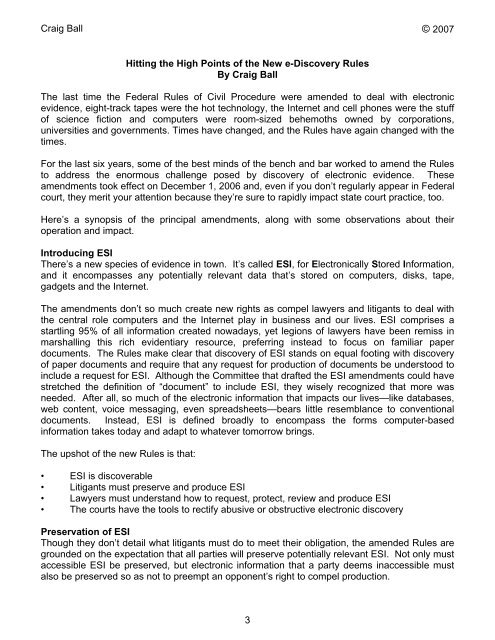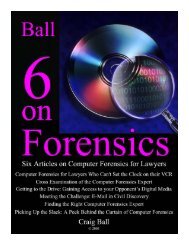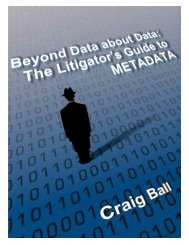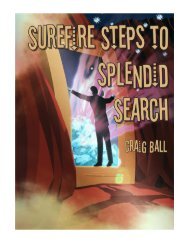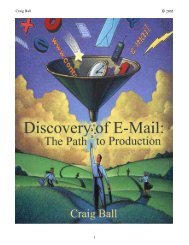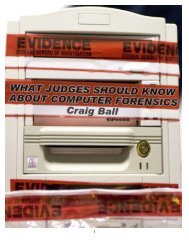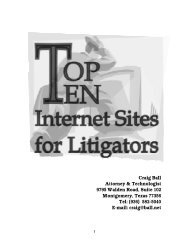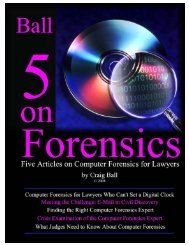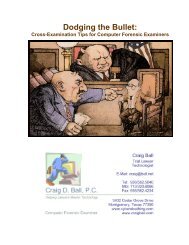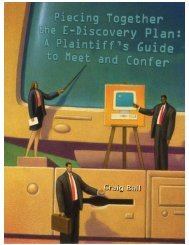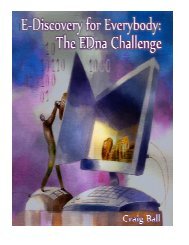Six Articles on Electronic - Craig Ball
Six Articles on Electronic - Craig Ball
Six Articles on Electronic - Craig Ball
You also want an ePaper? Increase the reach of your titles
YUMPU automatically turns print PDFs into web optimized ePapers that Google loves.
<strong>Craig</strong> <strong>Ball</strong> © 2007<br />
Hitting the High Points of the New e-Discovery Rules<br />
By <strong>Craig</strong> <strong>Ball</strong><br />
The last time the Federal Rules of Civil Procedure were amended to deal with electr<strong>on</strong>ic<br />
evidence, eight-track tapes were the hot technology, the Internet and cell ph<strong>on</strong>es were the stuff<br />
of science ficti<strong>on</strong> and computers were room-sized behemoths owned by corporati<strong>on</strong>s,<br />
universities and governments. Times have changed, and the Rules have again changed with the<br />
times.<br />
For the last six years, some of the best minds of the bench and bar worked to amend the Rules<br />
to address the enormous challenge posed by discovery of electr<strong>on</strong>ic evidence. These<br />
amendments took effect <strong>on</strong> December 1, 2006 and, even if you d<strong>on</strong>’t regularly appear in Federal<br />
court, they merit your attenti<strong>on</strong> because they’re sure to rapidly impact state court practice, too.<br />
Here’s a synopsis of the principal amendments, al<strong>on</strong>g with some observati<strong>on</strong>s about their<br />
operati<strong>on</strong> and impact.<br />
Introducing ESI<br />
There’s a new species of evidence in town. It’s called ESI, for Electr<strong>on</strong>ically Stored Informati<strong>on</strong>,<br />
and it encompasses any potentially relevant data that’s stored <strong>on</strong> computers, disks, tape,<br />
gadgets and the Internet.<br />
The amendments d<strong>on</strong>’t so much create new rights as compel lawyers and litigants to deal with<br />
the central role computers and the Internet play in business and our lives. ESI comprises a<br />
startling 95% of all informati<strong>on</strong> created nowadays, yet legi<strong>on</strong>s of lawyers have been remiss in<br />
marshalling this rich evidentiary resource, preferring instead to focus <strong>on</strong> familiar paper<br />
documents. The Rules make clear that discovery of ESI stands <strong>on</strong> equal footing with discovery<br />
of paper documents and require that any request for producti<strong>on</strong> of documents be understood to<br />
include a request for ESI. Although the Committee that drafted the ESI amendments could have<br />
stretched the definiti<strong>on</strong> of “document” to include ESI, they wisely recognized that more was<br />
needed. After all, so much of the electr<strong>on</strong>ic informati<strong>on</strong> that impacts our lives—like databases,<br />
web c<strong>on</strong>tent, voice messaging, even spreadsheets—bears little resemblance to c<strong>on</strong>venti<strong>on</strong>al<br />
documents. Instead, ESI is defined broadly to encompass the forms computer-based<br />
informati<strong>on</strong> takes today and adapt to whatever tomorrow brings.<br />
The upshot of the new Rules is that:<br />
• ESI is discoverable<br />
• Litigants must preserve and produce ESI<br />
• Lawyers must understand how to request, protect, review and produce ESI<br />
• The courts have the tools to rectify abusive or obstructive electr<strong>on</strong>ic discovery<br />
Preservati<strong>on</strong> of ESI<br />
Though they d<strong>on</strong>’t detail what litigants must do to meet their obligati<strong>on</strong>, the amended Rules are<br />
grounded <strong>on</strong> the expectati<strong>on</strong> that all parties will preserve potentially relevant ESI. Not <strong>on</strong>ly must<br />
accessible ESI be preserved, but electr<strong>on</strong>ic informati<strong>on</strong> that a party deems inaccessible must<br />
also be preserved so as not to preempt an opp<strong>on</strong>ent’s right to compel producti<strong>on</strong>.<br />
3


